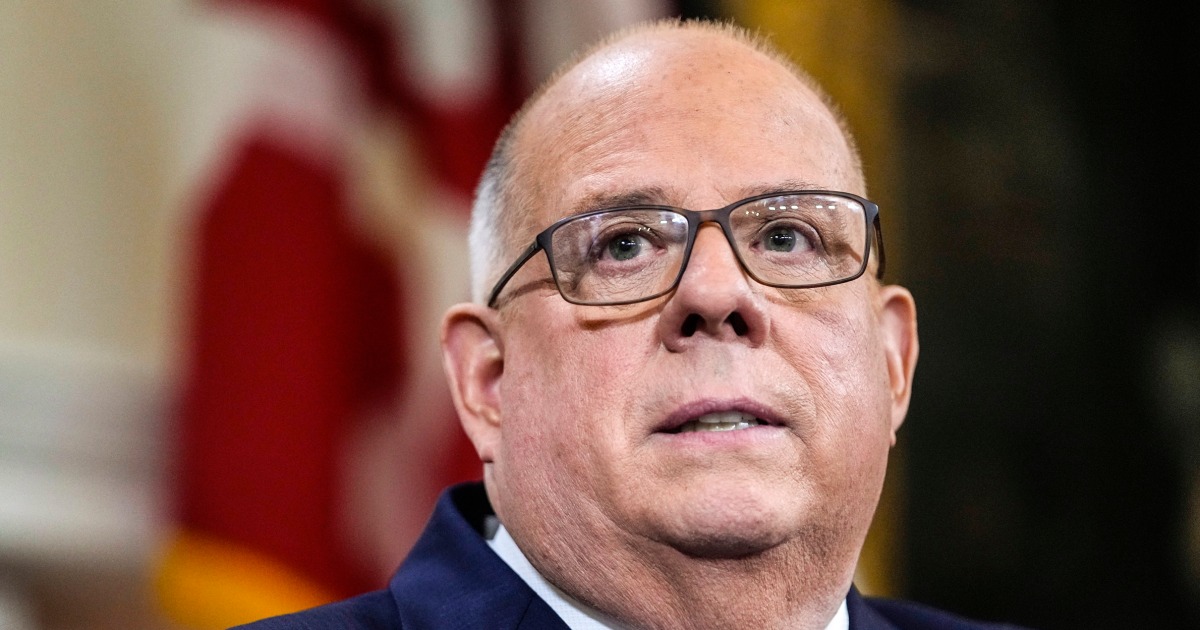
[ad_1]

Democrats have long known that they face a daunting Senate map in the 2024 elections. While Republicans will have to defend only 10 seats, Democrats will have to protect 23 seats, including a number in battleground or red states. The margin for error is razor thin: Depending on who wins the White House, the GOP only needs to pick up either one or two seats to seize control of the Senate. If Republicans prevail, they could either thwart most of President Joe Biden’s second-term agenda, or help Donald Trump unleash chaos upon his return to the presidency.
Recently, Democrats’ path to retaining the Senate has become significantly more difficult. Last month, on the last possible day he could register, former Republican Maryland Gov. Larry Hogan unexpectedly entered the race to succeed retiring Sen. Ben Cardin, D-Md. Hogan’s candidacy immediately turned what would normally be an extremely safe seat for Democrats into a genuine toss-up. And now a new poll shows the wildly popular former governor crushing his most likely Democratic competitors.
But while Hogan is not a MAGA Republican, he’s far from a moderate — and Democrats ought to hammer him for that.
A Washington Post-University of Maryland poll of Maryland registered voters conducted in March finds Hogan leading Rep. David Trone of Maryland 49% to 37%, and leading Prince George’s County Executive Angela Alsobrooks 50% to 36%. Moreover, 64% of registered voters hold a favorable view of him (including 61% of Democrats in a heavily blue state). Just 33% of voters reported a favorable view of Trone, and 26% held a favorable view of Alsobrooks.
This is far from a guarantee that Hogan will prevail in November. As a popular former two-term governor, Hogan has a major name identification advantage. The Democratic primary will allow his future Democratic opponent to close that gap. (Hogan is expected to clinch the GOP nomination with ease.) Notably, roughly half of the voters surveyed did not have a favorable view of Hogan’s potential Democratic opponents because they held “no opinion.” That number is likely to decline in the coming months.
The poll also found that 55% of voters favored Democrats controlling the Senate, compared to 35% who favored Republican control. That highlights a key line of attack for Democrats to launch against Hogan ahead of the general election. In a presidential election year, voters are more likely to be cognizant of the stakes of their votes at the congressional level.
But even with those caveats, Hogan should not be underestimated. He served two terms as a Republican in one of the most Democratic states in the country, and left office as one of the most popular governors in the state’s history. He has developed a reputation as an independent-minded, moderate Republican willing to work with people across the aisle. Marylanders also supported his response to Covid-19, which involved the swift adoption of safety measures and emergency legislation that, among other things, increased access to health care and reduced barriers to Covid testing. And crucially, Hogan has criticized Trump a great deal publicly and developed a political brand as an anti-Trump Republican through the way his pandemic response contrasted with Trump’s recklessness. The combined effect of his image as a likable, competent and independent-minded politician is his main strength heading into an election. Though these advantages over his future Democratic opponent will likely diminish, they are unlikely to disappear entirely.
But while Hogan is not a MAGA Republican, he’s far from a moderate — and Democrats ought to hammer him for that. As Time magazine’s Eric Cortellessa has pointed out, Hogan’s conservatism has conveniently been masked by the fact that his right-wing vetoes were often overridden by Maryland’s heavily Democratic state legislature. Hogan vetoed Democratic legislation in favor of criminal justice reform, voting rights, mandates for electricity to come from renewable energy, the right to paid sick leave, and mandatory background checks on gun sales. He also declined to sign a bill that required health insurance companies to give people equal access to fertility treatments regardless of their sexual orientation. Hogan’s biggest vulnerability is probably his veto of a bill to increase the number of abortion providers in Maryland.
Hogan’s case for representing Maryland in the U.S. Senate will entail depicting himself as an independent lawmaker with reasonable, middle-of-the-road views who won’t be cowed by Trump. But his voting record and his party affiliation indicate that he wouldn’t just caucus with Republicans, but that he would be a more consistent GOP vote than his supposedly moderate, bipartisan image would suggest. That would make Hogan either a thorn in Biden’s side or a potential Trump enabler — and that’s something Democrats can seize on.
[ad_2]
Source link